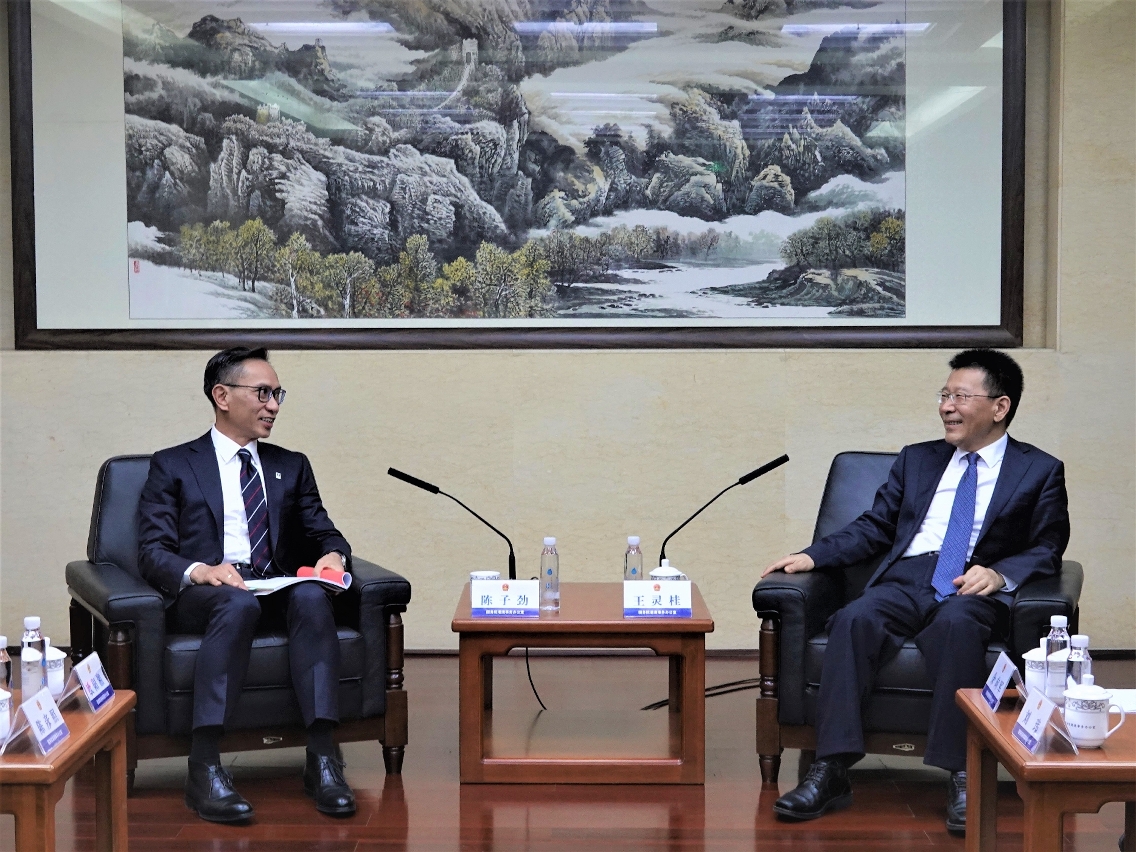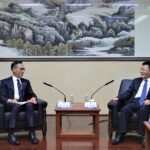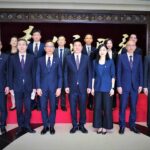 The Commissioner Against Corruption, Chan Tsz King, meeting with the Deputy Director of the Hong Kong and Macao Affairs Office, Wang Linggui
The Commissioner Against Corruption, Chan Tsz King, meeting with the Deputy Director of the Hong Kong and Macao Affairs Office, Wang Linggui
Recently, the Commissioner Against Corruption, Chan Tsz King, led a delegation to visit Beijing and Hebei, where they visited the Hong Kong and Macao Affairs Office of the State Council, the National Supervisory Commission, the Supreme People’s Procuratorate, the Ministry of Public Security, the Supreme People’s Court, etc. to discuss and exchange views on the actions of integrity building in the Macao SAR.
During the visit to the Hong Kong and Macao Affairs Office, the Deputy Director, Wang Linggui, pointed out that Macao should strengthen its awareness of integrity. Since Macao is currently dedicated to the participation in the building of Guangdong-Macao In-depth Cooperation Zone in Hengqin, it is necessary to explore the prevention of the occurrence of problems concerning illegality and corruption under the system of this area. Chan Tsz King agreed on the six requirements raised by the Director of the Hong Kong and Macao Affairs Office, Xia Baolong, during his visit to Macao at an earlier time. Chan believed that the CCAC is able to perform its functions effectively in terms of building a clean and efficient public service team and enhancing the quality of governance in Macao. In particular, it is necessary to strengthen the integrity awareness of the leaderships and chiefs of public departments and to remain highly alert to possible conflicts of interests.
During the visit to the National Supervisory Commission, the Deputy Director, Fu Kui, introduced the journey of corruption fighting and integrity promotion of the Chinese mainland and pointed out that corruption is the biggest obstacle to development. He also stated that as the year2023 ismarked as the beginning ofthe “20th National Congress”, he would support Macao’s active participation in the development of the Greater Bay Area and hoped to deepen the exchange and cooperation in corruption fighting with Macao. According to Chan Tsz King, in light of the easing of the epidemic situation, exchanges in various areas between the Chinese mainland and Macao have resumed. Therefore, he believed that there will be increasing cooperation in the combat of corruption in the future, which will provide integrity safeguard to Macao for its better integration into the overall development of the country.
During the visit to the Supreme People’s Procuratorate, the Prosecutor General, Ying Yong, stated that he hoped to further strengthen pragmatic cooperation with the CCAC and jointly combat cross-border corruption crimes in order to achieve new results concerning the promotion of the building of integrity and rule of law of the Chinese mainland and Macao. He added that regarding law enforcement and judicial area, the steadfast implementation of “One Country, Two Systems” should be promoted. Chan Tsz King stated that he noticed that the functions of public-interest litigation of the prosecution authorities of the Chinese mainland in recent years and those of the ombudsman of the CCAC are similar. He pointed out that enhancing exchanges between the two parties may bring inspiration to the CCAC to carry out relevant work.
During the visit to the Ministry of Public Security, the Vice-Minister, Chen Siyuan, agreed that judicial assistance between the two places should be promoted. He added that the Ministry of Public Security and the CCAC have established a more solid cooperation in recent years where cooperation in case investigation has been strengthened. In addition, he said that he supported the CCAC to propel the Government to perform its duties according to law. Chan Tsz King hoped that progress on the negotiation of inter-regional agreement on mutual legal assistance between the Chinese mainland and Macao can be achieved so that there can be strong support and basis provided for mutual cooperation. He also expressed his gratitude to the public security authorities of the Chinese mainland for their continuous support and assistance to the training work for the CCAC personnel.
During the visit to the Supreme People’s Court, the President of the Supreme People’s Court, Zhang Jun, introduced the situations of punishment meted out for corruption crimes by the courts in the Chinese mainland. He also pointed out that the courts in the Chinese mainland would further implement the development of the Guangdong-Hong Kong-Macao Greater Bay Area and the Guangdong-Macao In-Depth Cooperation Zone in Hengqin, positively promote the legal regulatory interface and connectivity and support Macao to better integrate into the overall development of the country. Chan Tsz King mentioned that he visited the intelligent information system of the Supreme People’s Court in the past and the system has greatly increased the administrative and trial efficiency of the judicial system. At present, the CCAC is also realising the computerisation of files and is developing an electronic system with the court so as to make possible, within a certain scope, data exchange in the area of declaration of assets and interests by public servants.
While in Beijing, Chan Tsz King also visited the Institute for Discipline Inspection and Supervision of the Tsinghua University, during which he discussed about the work of integrity building with the Dean of the Institute, Guo Yong. He also went to Hebei and met with, among others, the Director ofthe Provincial Supervisory Committee,Liu Changlin and Deputy Director, Huang Lifeng, where he was introduced to the local law enforcement and supervision work and both parties shared their work experiences.
Other delegates of the CCAC who paid visits with Chan Tsz King included the Deputy Commissioner cum Director of the Anti-Corruption Bureau, Ao Ieong Seong, and the Chief of the Cabinet of the Commissioner Against Corruption, Chan In Chio.




